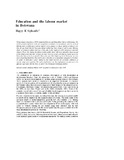| dc.contributor.author | Siphambe, H.K. | |
| dc.date.accessioned | 2011-09-15T09:59:43Z | |
| dc.date.available | 2011-09-15T09:59:43Z | |
| dc.date.issued | 2000 | |
| dc.identifier.citation | Siphambe, H.K. (2000) Education and the labour market in Botswana, Development Southern Africa, Vol. 17, No. 1, pp.105-116 | en_US |
| dc.identifier.issn | 0376-835X | |
| dc.identifier.uri | http://hdl.handle.net/10311/884 | |
| dc.description.abstract | Using primary data from a 1993/4 Household Income and Expenditure Survey in Botswana, this article presents empirical results on occupational attainment, its determinants, and the extent of filtering down in Botswana's labour market, given changes in labour market conditions over time. It was found that the Botswana labour market has been characterised by some ‘filtering down’ of educated workers into less skilled jobs as the supply of skilled manpower exceeded demand. Those who entered the labour market earlier, those with more education, those located in the urban areas and male workers are more likely to occupy jobs that are higher up in the hierarchy than to be in an unskilled blue-collar job. Jobs higher up in the hierarchy are also more rewarding financially. The article shows that there is occupational segregation of workers by gender in Botswana's labour market in that female workers are generally confined to a narrow range of occupations. The policy implications are that employment creation has to be pursued vigorously and the issue of gender discrimination investigated further | en_US |
| dc.language.iso | en | en_US |
| dc.publisher | Taylor and Francis (Routledge) | en_US |
| dc.subject | Education Botswana | en_US |
| dc.subject | Labour market Botswana | en_US |
| dc.subject.lcsh | Labour market--Botswana | en_US |
| dc.subject.lcsh | Education--Botswana | en_US |
| dc.title | Education and the labour market in Botswana | en_US |
| dc.type | Published Article | en_US |
| dc.link | http://www.tandfonline.com/doi/pdf/10.1080/03768350050003442 | en_US |

